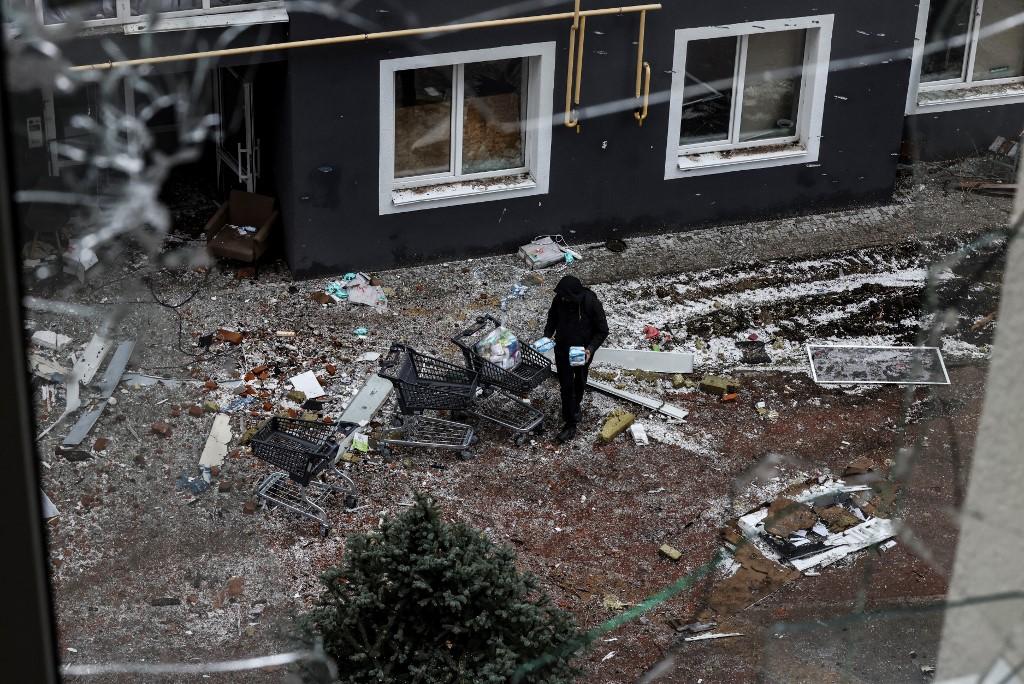Ukraine claims Kyiv region as Russian pullback reveals horror
Evidence has emerged of possible civilian killings in areas the invading forces have been occupying.
Just In
Ukraine said Saturday it has regained control of the Kyiv region, with Russian troops retreating from around the capital and Chernigiv city, as evidence emerged of possible civilian killings in areas the invading forces have been occupying.
AFP reporters saw at least 20 bodies on a single street in the town of Bucha near the capital city, including one with his hands tied, and the body of a missing photographer was discovered in a nearby village.
“All these people were shot,” Bucha’s mayor Anatoly Fedoruk told AFP, adding that 280 other bodies had been buried in mass graves in the town.
Meanwhile, in an attempt to raise economic pressure on Russia, the Baltic states of Latvia, Estonia and Lithuania announced Saturday that they had stopped all imports of Russian natural gas.
As it withdraws from some northern areas, Russia appears to be focusing on eastern and southern Ukraine, where it already holds vast swathes of territory.
“What is the aim of the Russian forces? They want to seize both Donbass and the south of Ukraine,” Zelensky said in a video address late Saturday. “What is our goal? To defend our freedom, our land and our people.”
But Ukrainian presidential adviser Mykhaylo Podolyak warned on social media that “without heavy weapons we won’t be able to drive (Russia) out”.
Ukraine authorities nevertheless offered citizens elements of good news Saturday in claiming progress against the Russians more than five weeks after Moscow’s invasion triggered Europe’s worst conflict in decades.
“Irpin, Bucha, Gostomel and the whole Kyiv region were liberated from the invader,” deputy defence minister Ganna Maliar said on Facebook, referring to towns that have been heavily damaged or destroyed by fighting.
Putin ordered tanks into Russia’s pro-Western neighbour on February 24, and Ukraine estimates 20,000 people have been killed in the war so far.
More than 10 million have had to flee their homes.
Pope Francis spoke of “icy winds of war” again sweeping over Europe as he brought up the conflict Saturday at the outset of his trip to Malta – and made what appeared to be a barely veiled reference to Putin.
“Once again, some potentate, sadly caught up in anachronistic claims of nationalist interests, is provoking and fomenting conflicts,” the pope said, adding he was still considering a visit to Ukraine’s capital.
Journalist killed with ‘two shots’
Ukrainian authorities said Saturday the body of a well-known photographer, Maks Levin, had been found near a village in the region around Kyiv that had been caught up in the fighting. Levin became the sixth journalist killed in the war, according to Reporters Without Borders.
Prosecutors said Levin, who was unarmed, “was killed by servicemen of the Russian Armed Forces with two shots from small fire arms.”
Levin, a 40-year-old father of four, had been reported missing on March 13; the body was found on April 1.
In Bucha, 16 of the 20 corpses found on one street were lying either on the pavement or by the verge. Three were sprawled in the middle of the road, and another lay on his side in the courtyard of a destroyed house.
An open Ukrainian passport lay on the ground next to the person who had his hands tied behind his back with a piece of white cloth. Two other people had white cloth tied around their upper arms.
All were wearing civilian clothes – winter coats, jackets or tracksuit tops, jeans or jogging bottoms, and trainers or boots.
“These are the consequences of Russian occupation,” said Fedoruk, Bucha’s mayor.
Ukrainian troops, meanwhile, were seen patrolling in armoured vehicles and on foot through the ravaged town, where some women wept as they stood outside their homes.
The International Criminal Court has already opened a probe into possible war crimes committed in Ukraine, and several Western leaders, including US President Joe Biden, have accused Putin of being a “war criminal”.
And in Russia, hundreds of people gathered across the country Saturday to protest the war in Ukraine. Police detained 211 people in several cities, including more than 20 people in a Moscow park under heavy snowfall, according to OVD-Info, a group that monitors arrests.
Verbal agreements
Russia’s efforts to consolidate its hold on southern and eastern areas of Ukraine have been hampered by the resistance of Mariupol despite devastating attacks lasting weeks.
At least 5,000 residents have been killed in the besieged southern port city, according to local officials, while the estimated 160,000 who remain face shortages of food, water and electricity.
The International Committee of the Red Cross (ICRC) said its team left for Mariupol on Saturday to make another attempt at conducting an evacuation, after being forced to come back the day before.
In another southern city, Enerhodar, which is under Russian control, a Ukrainian official said Russian forces opened fire on peaceful demonstrators, injuring four with severe burns.
In his video address, Zelensky thanked the residents of Enerhodar, the site of Europe’s largest nuclear power plant that had been seized by Russian troops in early March, for their bravery.
“When people protest, and the more they protest, the harder it is for the occupiers to destroy us, to destroy our freedom,” Zelensky said.
In a potential sign of progress, Ukrainian negotiator David Arakhamia told local television channels that Russia had “verbally” accepted most of Kyiv’s proposals in peace talks – except on the issue of Crimea, which Moscow annexed in 2014.
Among the agreed-upon points was that a referendum on Ukraine’s neutral status “will be the only way out of this situation”, Arakhamia said.
Subscribe to our newsletter
To be updated with all the latest news and analyses daily.
